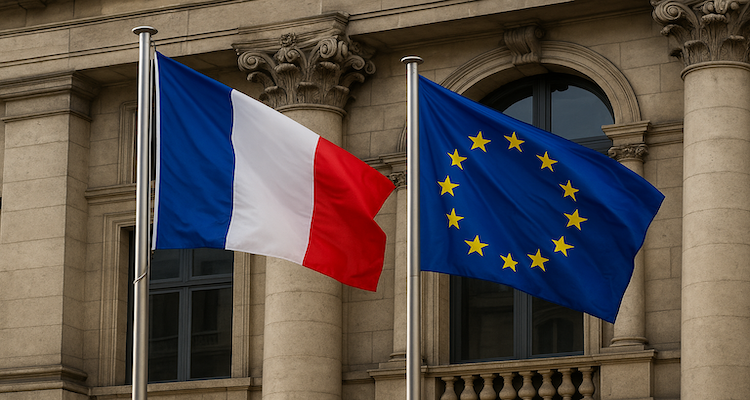France Threatens to Block EU Crypto Licenses in Oversight Clash

France warns it could block crypto firms licensed abroad from operating domestically, pushing for EU-wide supervision by ESMA to close regulatory gaps.
Introduction: France Turns Up the Heat on Crypto Regulation
France is signaling it may take drastic steps to rein in cryptocurrency companies exploiting Europe’s patchwork of licensing rules. The country’s top financial regulator has warned it could block firms licensed in other EU states from entering the French market, a move aimed at pressuring Brussels to centralize oversight of the fast-growing digital asset sector.
Context & Background: MiCA’s Promise and Pitfalls
Earlier this year, the European Union introduced MiCA (Markets in Crypto-Assets Regulation) a landmark law designed to harmonize digital asset oversight across its 27 member states.
Under MiCA, crypto firms can obtain a license in one EU country and use it as a “passport” to operate across the entire bloc. While intended to simplify compliance, the system has exposed major disparities in how national regulators interpret and apply the rules.
Some watchdogs are more lenient, raising fears of “regulatory shopping,” where crypto platforms choose the most permissive jurisdiction to secure approval.
Main Developments: France Pushes Back Against Weak Oversight
Marie-Anne Barbat-Layani, head of France’s Autorité des Marchés Financiers (AMF), told Reuters that crypto companies are exploiting loopholes by seeking licenses from regulators with lighter requirements.
On Monday, France joined Italy and Austria in urging the European Securities and Markets Authority (ESMA) the EU’s central markets regulator based in Paris to take over supervision of major crypto firms.
In its strongest statement yet, the AMF warned it may not rule out deploying what it called an “atomic weapon”: refusing to recognize certain EU licenses granted elsewhere. This would challenge the principle of passporting, a cornerstone of the EU single market.
Barbat-Layani admitted such a move would be legally complex and politically sensitive, but insisted it remains on the table.
Expert Insight: A Stark Warning from Regulators
“We cannot exclude the option of rejecting an EU passport,” Barbat-Layani said. “It’s a difficult legal step and sends a troubling signal for the single market, but we must preserve investor protection.”
She accused crypto firms of “shopping across Europe” to find the weakest licensing standards, without naming specific companies.
A joint paper from France, Italy, and Austria echoed her concerns, stating:
“The first few months of MiCA’s implementation have revealed significant differences in how national authorities supervise crypto markets.”
The regulators argued that only direct European-level oversight can guarantee consistent enforcement and stronger investor safeguards.
Oversight Gaps Under Scrutiny
The issue is not theoretical. Earlier this year, Malta’s financial authority faced criticism after an ESMA review found it failed to properly assess risks before granting a license to an unnamed crypto firm.
Meanwhile, other EU countries have already issued high-profile licenses: Luxembourg approved U.S.-based exchange Coinbase, while Malta licensed Gemini, founded by the Winklevoss twins.
Such disparities underscore the challenge of ensuring fair supervision across the bloc.
Impact & Implications: What’s at Stake
At the heart of the debate is the stability of a multi-trillion-dollar global crypto industry. Regulators have long warned that inconsistent oversight could not only harm retail investors but also threaten broader financial stability.
France, Italy, and Austria are now calling for reforms to MiCA itself, including:
-
Stronger rules on crypto activities conducted outside the EU
-
Tighter cybersecurity requirements
-
A review of how new token offerings are regulated
The AMF has consistently advocated for shifting oversight powers to ESMA, a move that ESMA chief Verena Ross has said she supports. But the proposal faces resistance from some EU members reluctant to cede regulatory control.
Conclusion: Europe Faces a Crypto Crossroads
France’s threat to block certain EU crypto licenses highlights the growing tension between national regulators and the EU’s ambition to create a unified digital asset market.
The battle over who should police crypto giants local watchdogs or ESMA will shape the future of Europe’s financial oversight. If France and its allies succeed, it could mark a decisive step toward centralized supervision. If not, regulatory fragmentation may persist, leaving the door open for crypto firms to exploit loopholes.
For now, the message from Paris is clear: Europe’s crypto experiment will not be left unchecked.
✅ (Disclaimer: This article is for informational purposes only. It is based on publicly available reporting and does not constitute financial or legal advice.)
ALSO READ: Markets Brace for Fed, ECB Moves as Bond Yields React to Global Policy Shifts











Thanks for sharing. I read many of your blog posts, cool, your blog is very good.